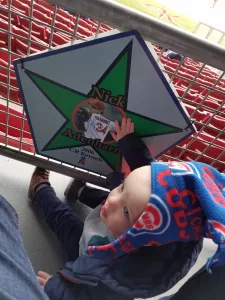Todd Brommelkamp/1600 ESPN
I spent some time Tuesday morning after finishing up on the air looking for a photo that was long ago stored away in my phone’s archive.
I hadn’t seen it since shortly after taking it and, upon locating it, was overcome with a wave of emotions.
My son is a few months shy of his second birthday in the photo. He sits bundled up on the concourse of Veterans Memorial Stadium, reaching out touching a sign featuring the image of a young pitcher mid-delivery.
Thomas will never know Nick Adenhart but he is aware his own name was almost Nicholas as well.
Today marks the 15th anniversary of Adenhart’s death, his life and career cut far too short by a drunk driver just hours after the best performance of his big league career.
I was at home in North Liberty the morning of April 9, 2009, when my phone rang. My now wife was in tears on the other end.
“Nick is dead,” she said.
My mind immediately went to her Little from Big Brothers/Big Sisters at the time. It was the only other Nick we knew.
“Turn on ESPN,” she said, and then it hit me with the weight of a thousand bricks.
About 12 hours earlier, at my suggestion, we had grabbed drinks at Buffalo Wild Wings in Coralville so we could catch the Angels and Athletics on TV. After three sub-par starts to begin his major league career in 2008, Adenhart tossed six scoreless innings against the A’s on what would prove to be the final day of his life.
I was glued to every pitch.
Adenhart spent the first part of the 2006 season in Cedar Rapids, his first full season of professional baseball after being drafted by the Angels in the 14th round of the 2004 MLB Draft. Had his arm not been injured his senior year of high school, he would have been a surefire first round selection. Instead, the Angels popped him with the promise of paying for his schooling at Arizona State while he rehabbed at the team’s facilities in Arizona.
Their faith in Adenhart’s arm paid off when he pitched across two levels in 2005, poised for a major breakout the following year. It came in Cedar Rapids as Adenhart fronted a rotation of talented pitchers that included fellow future big leaguer Bobby Mosebach and bonus babies Tommy Mendoza and Stephen Marek.
I was working for the Kernels handling media relations at the time and Adenhart was the first big-time prospect I ever had to deal with. Expecting a prima donna with no time for people around him on his inevitable march to Anaheim, instead I came to know a shy, humble 19-year-old kid who was still getting used to being away from home and dealing with the expectations of being a top prospect.
After getting off to a strong start that spring, demand for NIck’s time grew. Baseball America wanted to interview him along with an east coast media outlet and a writer from MiLB.com. We arranged times one after another on a Saturday morning while the team was wrapping up a homestand.
The appointed time for him to join me upstairs and take the first phone call came and went.
Uh oh.
Panic began to set in. I called the first writer and lied, saying one of the Angels’ instructors had made his way to town and was conducting a bullpen session with the right-hander. I promised to keep the writer updated and, no sooner had I hung up then the door opened and Adenhart walked in looking as if he had spent the night sleeping on the clubhouse couch. His hair was a mess, his prized right hand featured more than one stamp from a local watering hole.
Really, dude?
“I’m sorry,” he muttered. “What do we do now?”
He was surprised to learn I’d already been running interference. As he made his first phone call roughly 10 minutes later than scheduled, I was on the line with the next outlet.
“Mike Butcher made a surprise visit today,” I said, referencing Anaheim’s minor league roving pitching instructor at the time. “Nick’s running late and getting caught up with another interview.”
When phone call No. 2 started, the same story was relayed to the final writer.
From that day on, we were tighter than ever.
“You’re going to need a PR guy after you win the Cy Young Award,” I told him.
He’d keep me in mind, he said with a grin.
By the end of the season he had been promoted to the Angels’ High A affiliate in Rancho Cucamonga, California, and I was out of baseball. That’s another story.
We reunited in 2007 when my now-wife and I traveled to catch the Arkansas Travelers in Wichita, Kansas. He was genuinely surprised to see us on the concourse of Lawrence-Dumont Stadium. The youngest player on a Double A team filled with guys at least a couple years older than him, he was lonely and out of place. We took him and another former Kernels player, Brad Coon, out for dinner afterward.
It was dinner or watching “Entourage” and he chose dinner. We’d understand if he didn’t want to come, we said. This was long before missed episodes of a show were streamed on-demand. Maybe he’d be able to catch a replay.
When we returned to Iowa a day later, I recorded a replay of the latest episode and mailed the VHS cassette to Little Rock. Did he or a teammate have a VCR? I sure hoped so.
I saw Nick one more time after that. He pitched in Des Moines against the Iowa Cubs in 2008, shortly after a disastrous three-start audition in the majors when the Angels were pressed for pitching. He wasn’t ready for the call and it showed. He walked 13 batters across 12 innings, striking out only four and recording a 9.00 ERA in the process.
After he obliged several fans and autograph collectors with signatures outside the visiting clubhouse at Principal Park, we embraced. With me I had brought a copy of a book, Mental Toughness: Baseball’s Winning Edge. I mentioned I knew he was struggling mentally with the failure of that first promotion and assured him he’d be back better than ever at some point.
For a longtime I thought back to that moment. That last handshake. That last grin. Would it have been better to know those were all lasts?
Over drinks several years later, Nick’s stepdad told me that book was in Nick’s bag when his locker was cleaned out at Anaheim Stadium.
I’ve seen a lot of pitchers come through the minor leagues over decades of attending games. Very few hurlers qualify as can’t miss prospects. Despite the early career struggles, I remain convinced Adenhart would have flourished in MLB. His start against Oakland (during which Cedar Rapids native Ryan Sweeney collected a pair of hits) was evidence of a surface that was just getting scratched.
For years I carried one of Nick’s 2008 Topps Update baseball cards in my wallet. I had planned on having him sign it for me at a big league park during the 2009 season. Instead, I placed it in the top photo sleeve as a reminder to make good decisions when I was out drinking with friends.
Two other people who were in the car with Adenhart died that night. The driver of the other vehicle is serving 51 years in a California prison for their deaths.
Nick Adenhart would be 37 years old today, his career likely over whether it had been successful or not.
The Kernels honor his memory every year through a scholarship that is awarded annually to local students that exemplify his work ethic in the classroom and on the athletic front. A memorial remains on the outfield wall of Veterans Memorial Stadium.
There’s that picture behind home plate as well. The one my son was so oddly enamored with that day in 2018.
Much of the baseball world has forgotten about Nick Adenhart but his memory lives on here and that seems more than fitting. He loved playing in Cedar Rapids, his family told me once. It was his favorite stop in the Angels system.
Fifteen years…
The memories and the tears are still fresh.
Todd Brommelkamp is the host of “The Todd Brommelkamp Show” and can be heard weekday mornings on 1600 ESPN from 6:30-9 a.m.
